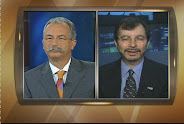
Bloomberg reports today that major money manager, Mark Mobius, has joined four financial titans (Jamie Dimon, JP Morgan Chase; Lloyd Blankfein, Goldman Sachs; John Mack, Morgan Stanley; and Richard Fuld, Lehman Bros.) in proclaiming that the end of the credit crisis is in sight. Such statements are astonishing in that the root cause of the problem – structured products, securitization, and leverage – is in the midst of a deleveraging process the consequences of which remain largely unknown.
Perhaps there is information that the above gentlemen possess that gives them confidence to make such bold pronouncements. Or perhaps it is the desire to instill a degree of counterparty and investor confidence, which will thereby help in a thawing of the credit freeze.
Needless to say, however, their optimism flies in the face of other views, notably the recently released report by the IMF, “Global Financial Stability Report” (with its estimated $945 billion of losses - see above chart*), as well as comments and views from other experts more directly tied to the credit markets (for example, listen to my interview posted yesterday with CreditSight’s CEO).
If I had the ear of the five gentlemen, I would ask their views on how the recently increased estimated $62 trillion of credit default swaps will unwind with little effect? I would also like to gain their insight on how the deleveraging process, the changed business models of financial institutions, and the likely political backlash (Bear Stearns bailout) will not have an effect on the bottom line of financial institutions? Lastly, and most importantly, I would seek to gain the benefit of their wisdom as to how the US economy escapes the consequences of all of the above next year, the first year of a new presidency and one that will lack the tailwinds of the current stimulus package?
Investment Strategy Implications
It has been argued on this blog and in my reports that stocks are undervalued and have several reasons to stage a decent comeback. That appears to be well underway. It has also been argued here that the consequences of deleveraging have not been fully appreciated by investors.
Therefore, the key point that equity investors should take under advisement is that the credit crisis not just about subprime mortgages, it is about a business model (originate and distribute) that has functioned at the core of the credit creation system for more than a decade that is likely to undergo a major transformation (on several levels) the consequences of which no one knows with any degree of certainty.
That said, the spring equity respite should be enjoyed for what it is – an undervaluation rally. Beyond that, a more clearly understood new financial order will be necessary for investors to more accurately predict what is shaping up to be a very risky 2009.
*click on image to enlarge













































